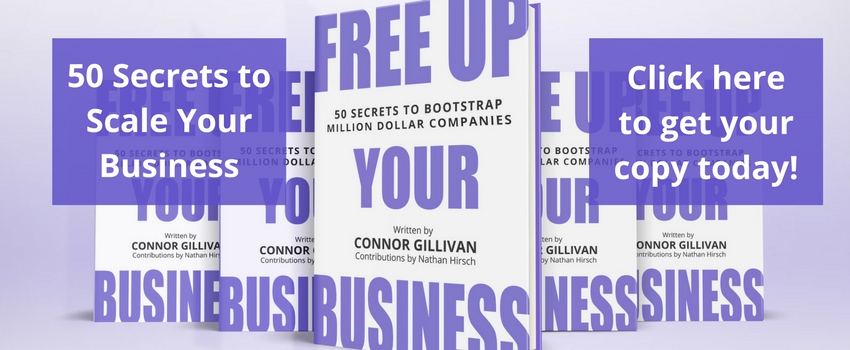
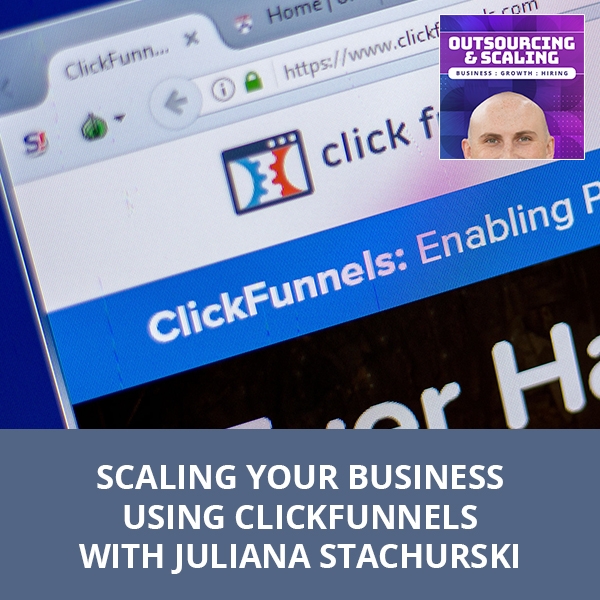
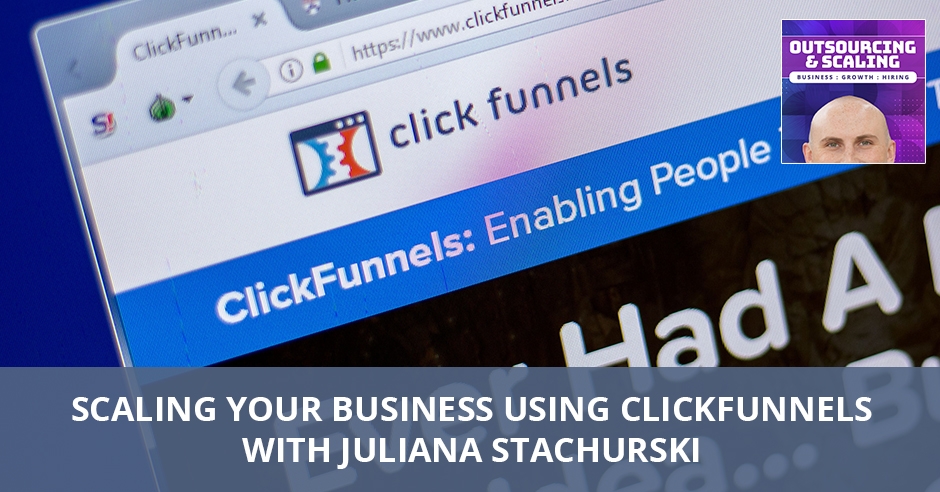
—
Listen to the podcast here:
[smart_track_player url=”https://www.podetize.com/statsapi/www.podetize.com/wp-content/uploads/fileuploads/11-5b145ef137b51b3d1af0633e9305c43d/06/2019/204b71d552da1bbfce9f74963b013530.mp3″ title=”Scaling Your Business Using ClickFunnels with Juliana Stachurski” artist=”Nathan Hirsch” image=”https://freeup.net/wp-content/uploads/2019/04/OAS.png” ]
Download the audio file here.
Scaling Your Business Using ClickFunnels with Juliana Stachurski
I have a special guest. Juliana, how are you doing?
I am doing great. How are you doing?
I’m doing great. For those of you that don’t know, Juliana is a highly sought-after speaker who has performed at some of the biggest stages in the US. With a formal background in education and law, she has taught at several universities. Her gift for reigning in information chaos makes her lessons power packed and easy to apply. Juliana has led multiple companies through hyper-growth using ClickFunnels as her secret weapon to ignite rapid conversions. Her mission is to amplify good by ensuring entrepreneurs have the tools and resources to succeed. Juliana is an island girl at heart with a family in Maui in the Pacific Northwest. Food is her love language. She resides in Nashville and is happy doing good food and good music with her favorite people. When you were a kid, what were you like growing up? Were you a straight-A student? You’re obviously a hard worker. Were you a hard worker back then? Did school motivate you?
It did and I was a good student. I wasn’t a straight A student, but I was an honor roll kid. I did well in the classroom, but I also had a tendency to get in trouble because I talked a lot. I was the kid that got moved around and reminded of what I was supposed to be doing. I was rarely a sit-down and be quiet kind of kid. I started setting music at a very young age so that helped corral my focus because it gave me a distinct path to follow at an early age. Without that, I am by nature, all over the place. I needed some of those boundaries when it came to practicing to help reign it in. I loved being outside. I love running around climbing trees. We lived at a great spot with a lot of access to the outdoors so I’m very lucky with that. As far as school, I am good, but at the same time managed to sit in the hall a fair amount of time as well when I was growing up.
You’re running your own business. You have Ellis Pond. You’re very involved in the ClickFunnels community. Talk to me about your first entrepreneurial adventure.
My first entrepreneurial adventure, I was super. I was about five and a half. We lived right close to a park and I saw people. I had heard about a thing called a lemonade stand. I want a lemonade stand because I wanted to earn money. I didn’t get an allowance growing up. We’re that kind of a family. My parents encouraged us like, “If you want to run a lemonade stand, you can, but you have to set it up.” I’m in front of the house and my dad was a banker. He wouldn’t let me have my lemonade stand until I knew how to make a change. I charged a dime because if somebody gives you a quarter, what do you do? I had to learn how to make a change and that was fine. I learned the hard way that they weren’t just going to give me a lemonade in cups. My parents charged me. I was five years old and they charged me for the cost of goods.
[bctt tweet=”Have an honest conversation about yourself of what’s important and use that as a guiding light.” via=”no”]
I was like, “What is this?” I had money saved up for my birthday or whatever so I bought a lemonade. It was a Minute Maid stuff that came in a can that you add water and the cups. I set up and I had a stellar day. I made $3 and I was excited. The next day, it rained and I made no money at all. I was so bummed. At an early age, I learned that money doesn’t roll in because you had a good day and that was a good first lesson to learn. I went to Seattle University. I was in their honors program. I was active in their music program as well. I have a degree in history and philosophy. After that, I went to law school. I went to Seattle University School of Law. I graduated from the University of Washington with a paralegal certification and I did work in the legal field for quite some time. When I moved to Nashville, my very first gig was teaching at Vanderbilt University, LSAT and MCAT prep courses for Kaplan.
You have this law degree in your back pocket. There are not a lot of people who would get a law degree and then become an entrepreneur, although it helps you. I wish I had a degree in my back pocket. I can’t imagine a hertz, but why make that pivot? Why go down the entrepreneurial route away from the law?
I would suggest that a lot of attorneys or lawyers that graduate from law school decides to have their own practice are entrepreneurs. That’s one of the lies that they don’t tell you. If you’re a lawyer, if you’re a doctor or a dentist and you’d go out and you want to make money for all the knowledge that you gained and all the skills that you’ve got, you’ll pay a lot of money for law school, medical school or dental school. Even though you are a lawyer or a doctor by education and you have the fancy piece of paper to hang on the wall, you’re also an entrepreneur because you’ve got to get clients. You’ve got to run your business and you’ve got to make things happen.
As far as pivoting from how I generate revenue by providing legal services to generating revenue for my own company by helping other businesses, that pivot came because I have a paralegal certification and not a law degree. What I didn’t share with you is my husband and I have a bunch of kids. We have eight biological children. During the three years of law school, I also happened to have three babies and realize that full-time law school plus full-time momming was not a great combination. My babies are only going to be young once and I decided that’s where I was going to spend my time. The number one reason why I don’t practice law is that I am not an attorney. The number two reason why I didn’t pursue my JD later in life is that I learned that being in business with my husband and working in marketing specifically is where my bliss was. I could help a lot of people. I could generate a lot of revenue for other companies, but also help take care of my own family by doing something that I was good at and that I loved.
What advice do you have out there? There are a lot of moms that are clients of mine and most of them don’t have eight kids. They might have one, two, three and they’re struggling to balance it. How were you able to do that and what advice do you have for them?
There’s no such thing as balance. It’s all about priority and having an honest conversation about yourself of what’s important to you and using that as a guiding light and not so much as an anchor. You’ve got to be grounded but as a guiding light. Once you decide what’s important, every decision you make, whether it’s for your family directly, for your business or for your involvement in the community, it goes through that filter and it goes through that paradigm. You get to decide where in order of priority you want to place it with regards to your time. Nathan, I petitioned there are 24 hours in a day. My appeals keep getting denied. There are still only 24 hours in a day. Deciding what’s most important in what you’re going to get done is the key to being able to wake up in the morning and take that next step because otherwise, it can be completely overwhelming.

It’s about prioritization and time management now that I have any kids, but it’s the same thing no matter what you’re trying to balance. I know you have the lemonade stand. Let’s talk about the first company that you built. How did you come up with the idea? Walk us through that first year because I’m always fascinated by how people do it in that first year, especially when it’s their first business.
We were very tentative getting into business and here’s why. Number one, we had a lot of kids so we couldn’t throw caution to the wind and dive in with two feet. My husband had a regular day gig and I had a part-time gig here in peer. We started very small in online marketing in PPC and learning how this whole “you make money online thing” worked. From that, we learned a little bit more about sales funnels, online marketing and how that could work. Our first year was learning, growing and investing in ourselves. We weren’t making a ton of money and that was okay because we had the regular day gigs that we could rely on to pay for the things that we needed to do. In 2013, my husband decided that his day gig working as a corporate cog wasn’t going to work.
We went in and created a company called Franklin Networks. What that was is developing high-value domain names. We were doing content marketing and we were making money doing advertising arbitrage. What that means is we create a very beautiful site with content that’s amazing that everybody can see. We would drive traffic there and we would sell advertising on those sites. The money that was in between driving traffic and selling ads is the money that we made. In that first year, we were six figures positive in the first 90 days. Google changed its mind and that ended. It was a screaming deal and it was a great model for about thirteen months.
This was an important lesson. We had all our eggs in that basket. It was awesome when it was awesome. When it wasn’t, it got scary fast. That talks a good lesson about diversification. That taught us about our risk tolerance. It taught us that even if things are going awesome, the importance of not just saving for a rainy day but having that parachute plan for not if things change, but when things change. We need to have something that you can gracefully pivot too so that you aren’t caught going, “Google changes things. The world has ended.” Those were some important lessons that we learned during that time.
Talk to me about your first hire. Who was it? How did it go?
It went poorly. I have those contractors that come to our offices and work with the family. We have hires that we have online. With my very first in-person hire, we put out an ad on Craigslist and we needed some admin help in the office. Up until that time, we had been wearing all the hats. I was a business owner. I was customer service. I was in accounting. I was creating the deliverables. I was like, “I can’t keep doing this because I need to sleep at some point in time. I need to have somebody to come in.” We thought that the very first thing we would do is have someone come in and help with some of the admin things and some of the bookkeeping and reconciliations. I interviewed several people and I learned a lot in the interview process. I learned that maybe putting an ad on Craigslist wasn’t the savviest business decision.
[bctt tweet=”At its most basic level, a funnel is an online journey that you take your visitor to a point of decision.” via=”no”]
How come Craigslist is so good at hiring or something like that? I was like, “That’s not the experience that I’ve had.”
I hired a woman. She seemed nice in the interview. I was like, “I think this is a good fit.” I looked at her resume and we had the conversation. I was like, “Can you start on Monday?” She said, “That’s fabulous.” We did all the paperwork and we got in. She didn’t show up. I didn’t know what to do because I had never not shown up for work. It was outside my scope of reality that somebody might say they would show up for work and then not. I was confused and I didn’t know what to do because I had pulled my ad from Craigslist. I stopped interviewing people. I thought I had found somebody and this woman didn’t show up. She showed up and she was two hours late. I assumed that somebody had died because why would you show up two hours late unless there was something legitimately wrong. She was like, “It was no big deal.” I was like, “That’s going to be a problem.”
I also didn’t realize that when you’re the boss, you can let people know what the rules are early on. She was ten or fifteen years older than me. She rightly diagnosed that I was on the younger side of things. She took advantage of my naivete and also, I allowed that to happen because I didn’t know any better so it was painful. I liken it to when you buy a pair of shoes that look super cute in the store and you try them on and they pinch, you think, “I’ll break them in. It will be fine. We’ll figure it out. It will be great.” When you wear those shoes, they just hurt. When your feet hurt, your whole being hurts. That’s what my first hire was like. It was like that super cute pair of shoes that didn’t fit right and was murderous on my day. It was a good 90 days before I finally let her go.
That was horrible because I had never fired anybody before. I called my dad and I was like, “I’ve got to fire this person. I don’t know what to do.” He’s a banker so he’s had to hire and fire. Not only did he help walk me through the process to make sure that I had done the right papers and we had things from a solid business perspective, but also the little things that I’ve carried through the course of my career. When you fire someone, you have Kleenex on the table. We have little things that matter, but it’s not in any checklist. Some of those are intangible so I’m grateful for my dad for walking me through that.
I still remember firing my first person who was painful. It was a friend of mine. I made the classic mistake of hiring a friend when I was in college and it was brutal. You have internal people in your office and you have virtual people. How do you keep it all together? How do you build a culture where some people are with you and some people are not? A lot of our audience is in that position or at least considering putting their business in that position.
The most important thing is that every business should understand who they are, whom they serve and why that audience cares. Every single person in the organization, from your brand-new VA to someone who’s been with the company for five to seven years, when you say, “Who are we? Why do we care? Why are we in business?” They should know even if they have a little cheat sheet next to their computer on a post-it note. Having that alignment and purpose is vital, especially when you have a workforce that is all over the world. Everybody needs to know why we’re doing our thing. The next thing that’s important is that there needs to be a clear understanding of how their work helps with that big picture goal.

Let everyone know that they are participating in something that’s a lot bigger than my accounting person who does a good job of making sure my books are balanced is as important as my person who is running digital ads for me. It’s as important as someone who is helping craft the language, the words, my copywriters for the presentations that we give or building my slides. It’s the idea that we are all actively participating in moving our company forward. It’s important to me that everyone that I employed has a properly structured compensation plan so that they also benefit when things go well. They understand that if things don’t go well, we can’t be as generous with the flexible part of their compensation.
Let’s forward ahead to ClickFunnels. When did you come across ClickFunnels? What were you doing before it and why are you excited about ClickFunnels?
I started using ClickFunnels in 2015. I was part of the brand at that point in time and we were doing some super-duper big things. I didn’t know that ClickFunnels has only been open to the public since September of 2014 so we were in that early adopter phase. I can tell you with certainty that at first, I was not in love with the platform at all because things were buggy. They were still learning and they were still growing. I remember being in the ClickFunnels group early on and someone there was very vocal about the real world implications of when something is buggy, that’s costing us, business owners, thousands of dollars a day if something wasn’t working. The cool thing is that ClickFunnels invested in their platform, they invested in their people, things got better and things are working.
I personally have helped generate over $10 million inside of ClickFunnels using their platform for myself or for other clients so I know that the system works. When I have something that works and works well, I love it. Fast forward, ClickFunnels put out a call for speakers. I was excited because, at the beginning of 2018, I decided that I wanted to do more public speaking. It was important to me as part of my journey that it was where I wanted to focus my priority and focus my attention. I thought, “I’ll audition for this.” I did and it was great. They had several rounds of auditions and they whittled it down. At the end of the day, there are twenty of us that they invited to Boise, Idaho. We got to have some training with Russell Brunson in person. We spent two days in Boise. It was wonderful to meet people from all over the world who were selected to be part of the ClickFunnels international speaking team. To get trained in person by Russell Brunson is an absolute dream. I’m super stiff, but I’ve already been on stages all over the US talking about ClickFunnels to audiences of entrepreneurs. I’m sharing how they can leverage this tool to make a huge impact, drive revenue, and help move things forward for them in their businesses.
Let’s talk about ClickFunnels’ basics for people out there that have a business. They’re doing well, but their funnel isn’t set up. They’ve probably heard the word funnel a million times, but they haven’t gotten there. Give us the basics of ClickFunnels, why they should be using it and how to set up a good funnel for your business.
At its most basic level, a funnel is an online journey that you take your visitor to a point of decision. For us, that point of the decision might be, “I want to give you my email address,” or that point of the decision might be, “Take my money and I want to buy your staff.” What’s most important is understanding which funnel is right for your intended purpose. A lot of people when they start, they say, “I’m going to do funnels.” They watch a bunch of YouTube and they get excited. It is exciting and they see a bunch of success stories, but they don’t take the time to sit and go, “In my business, is it important for me to generate leads? Is it important for me to grow my audience that I want people to talk to? Is it important to me?”
[bctt tweet=”A good story is something that will emotionally resonate with your audience.” via=”no”]
I’m an eCommerce and I’ve got this thing that I want to sell. I want to use a funnel to sell this thing. At first, you need to understand what the purpose is and why you’re creating a funnel in the first place. The next thing is way too often, people want to overcomplicate things. They see these pretty beautiful mind maps of these funnels and dependencies and if this then, that or not. It’s like this huge map or maze. When you were first starting out, you could have a two-step funnel. It’d be a perfect fit for your business to get traction and get you to your goal. It’s always about the end in mind. Understand what you want to accomplish. What that yes is, when it’s going to be, and build from there.
Let’s say that someone has a funnel and it’s not converting the way that they want it. What are the common mistakes that you see and what advice do you have? Every funnel is different, but there have to be some core strategies to take a funnel from C to A.
If your funnel is not converting, it is one of three things. Number one, it could be that your hook is wrong. You are using the wrong thing to get attention from the people you want your yes from. Number one is to take a look at your hook. Is it right? Am I talking to the right people? The second thing that could be wrong is the story that’s in at your funnel. Are you saying the right words to resonate with your audience to grab and make that emotional connection? Are you giving the right instructions for them? Are you telling them where to click? You would not believe how many times I have looked at funnels and I’m like, “I want to buy something. What do I do?” There’s no button. I’m sure you’ve done that where you’ve gone to websites and you’re like, “What’s next? What do I do? Tell me where to go.” It could be simple like, “You’ve got to put the button. Give me a way of mechanism to take the next step.”
Number one, your hook could be off. Number two, your story could be off. You’re using the wrong words to communicate with your audience and the third thing that could be wrong is your offer. You want to make sure that your offer is the right fit for what you have been presenting to your audience. My classic example is I go through a funnel. If I am a pet owner and they want to sell me pet foods, if I get to the end of the funnel and I have an offer for cat food, I’m not going to buy it even if the funnel is perfect or even if the copy was the most elegant copy I’ve ever read because I’m a dog owner. Simply saying that “Pet owners, I’ve got something for you,” isn’t enough. You have to make sure that the offer is dialed in for exactly who that audience is that you’re attracting.
Let’s talk about the story because stories are so important and a lot of people miss that. What makes a good story?
A good story is something that will emotionally resonate with your audience. It’s super important that it is relatable and that there is a lesson that we can take from that. At its most basic level, I need to identify the person I want to talk to like, “Are you an entrepreneur? I’m going to tell you a story about something that happened to me as an entrepreneur and I’m going to give you a way to solve whatever that common pain point we might have.” When I was first hiring VAs, I didn’t have a good vetting system. There are many other platforms. I’m going to say, “Are you an entrepreneur that wants to scale and knows you need content?” I know who I’m talking to. I’ll say, “When I first started, I had no idea how to find a good copywriter.” I’ll tell you a story about that, which they probably resonate with and I’ll say, “Here are the ways that you want to go about it.”
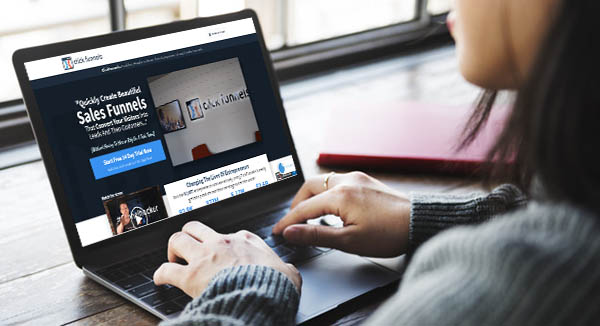
What else did I miss? What else should people know about ClickFunnels?
People should know that ClickFunnels applies whether you are starting out or if you are several years into the business and you’re looking for a way to bump out of that plateau. That is super important. It’s a platform. You can leverage that platform regardless of where you are in your journey as a business owner.
Where do you see funnels going? They’ve obviously come a long way since you started 2015 to 2019. What do you see in 2020 and beyond?
I am super excited for 2020 and beyond because as we evolve at the speed of the internet, we have much more capability than we had in 2015. The things that we can do with funnels now are much more advanced because we have additional features within the platform where I can actively communicate outbound with my customers. I have a way now that if I’m speaking at an event, I can put up on a slide and number that they can text to opt into the front end of my funnel. It means that if I’m speaking to a room of 500 people, there’s no way I can talk to 500 people one-on-one. What I can do is after they’ve heard me speak, I’ll put a number up on the screen for them to text. The people that are interested in having that one-on-one conversation with me, I can take care of that digitally. I can make sure that people that need my time and attention have an opportunity to get on my calendar. I can scale that much faster because I’ve leveraged technology using ClickFunnels for my business.
Juliana, where can people find out more about you and what are you excited for the rest of the year?
People can find me at EllisPond.com. What I am super excited about is scaling my own business. I’m super excited about the marketing workshops that I’m doing right now. I’m talking to you from a hotel room. I’m in Richmond, Virginia. I wrapped up a two-day workshop with an awesome local business here and I love the idea that we are able to help small businesses blow past the revenue goals by leveraging technology and we’re doing that with ClickFunnels. I’m super excited about that.
Thank you so much for coming on the show. I appreciate it. I’m sure we’ll be in touch soon.
Thanks.
Important Links:
- Juliana Stachurski
- Ellis Pond
- ClickFunnels
- EllisPond.com
About Juliana Stachurski
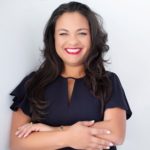 Juliana is a highly sought after speaker who has performed on some of the biggest stages in the US. With a formal background in education and law, she has taught at several Universities; her gift for reigning in information chaos makes her lessons power packed and easy to apply. Juliana has led multiple companies through hyper-growth using ClickFunnels as her secret weapon to ignite rapid conversions. Her mission is to amplify good by ensuring entrepreneurs have the tools and resources to succeed. Juliana is an island girl at heart with a huge family on Maui and in the Pacific Northwest. Food is her love language. She currently resides in Nashville and is happiest enjoying good food and good music with her favorite people.
Juliana is a highly sought after speaker who has performed on some of the biggest stages in the US. With a formal background in education and law, she has taught at several Universities; her gift for reigning in information chaos makes her lessons power packed and easy to apply. Juliana has led multiple companies through hyper-growth using ClickFunnels as her secret weapon to ignite rapid conversions. Her mission is to amplify good by ensuring entrepreneurs have the tools and resources to succeed. Juliana is an island girl at heart with a huge family on Maui and in the Pacific Northwest. Food is her love language. She currently resides in Nashville and is happiest enjoying good food and good music with her favorite people.
